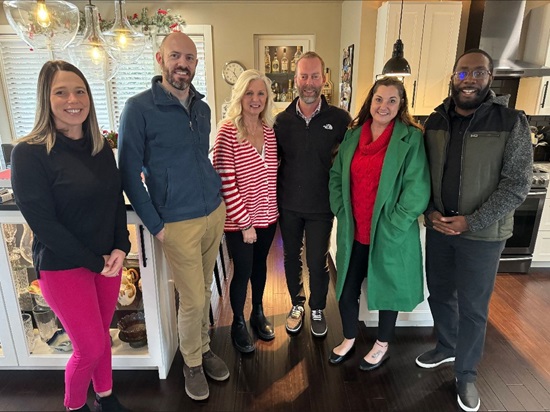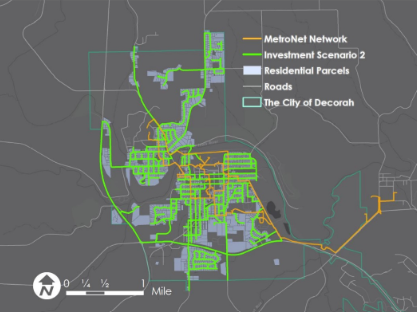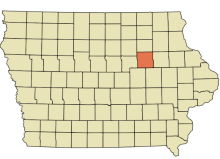
Fast, affordable Internet access for all.

Alabama has announced the release of $148.3 million in new broadband grants via the state’s Capital Projects Fund (CPF), made possible by the 2021 American Rescue Plan Act (ARPA). While regional monopolies like Charter nabbed the lion’s share of state funding (once again), cooperatives also secured significant funding to tackle the rural digital divide.
“High-speed internet service continues to strengthen and expand across the state, and we are taking the necessary strides on this journey to achieve full broadband access for Alabama,” Alabama Governor Kay Ivey said in a prepared statement. “This has been a monumental task, but it is one that will pay multiple dividends for our state and its residents. Today is an exciting day as we announce these latest projects.”
Cable giant Charter Communications (Spectrum) was the biggest winner of state funds, awarded 23 grants totaling $44.8 million to shore up access to 22,000 underserved homes across 25 Alabama counties. The next biggest award recipient was Mediacom, which received $22.8 million in grants to fund deployment to 8,000 homes across six Alabama counties.

All told, 16 providers were awarded grants to expand access to 48 different Alabama counties. While regional monopolies were heavily represented in the awards, four different Alabama cooperatives received $34.8 million in grant funding to expand fiber access to more than 11,092 rural Alabama homes and businesses.
Waterloo, Iowa’s municipal broadband project has taken a major step forward after nearly two decades of planning.
Waterloo Fiber officials just launched their first limited fiber trial, will connect their first commercial customers in February, and are on target to deploy affordable fiber at speeds up to 10 gigabit per second (Gbps) to every last city resident by 2026.
When we last checked in with Waterloo in February of last year, the city was putting the finishing touches on a plan to spend $115 million to build a fiber backbone accessible to all 67,695 Waterloo residents, after locals approved the city issuing general obligation bonds to fund the start of the three-phase construction project.
Construction of the network began last summer at a groundbreaking ceremony hosted by Waterloo Mayor Quentin Hart.
“It will be the lifeline that connects our entire community, enabling businesses to thrive, students to excel and families to stay connected," Hart told attendees. "This fiber system will lay the foundation for a smart city innovation, economic growth and an enhanced quality of life for all our residents."

Last month the city connected the first of four participants in a limited pilot project.

A little more than three years ago, the city of West Des Moines, Iowa announced that it would build a citywide open access conduit system to lower the cost of new broadband deployment to facilitate better connections at lower costs for residents. GFiber (formerly Google Fiber), Mediacom, Lumen (formerly CenturyLink), and local ISP Mi-Fiber have since signed on as providers.
This week on the podcast, Deputy City Manager Jamie Letzring and city Innovations Consultant Dave Lyons join Christopher to talk about overcoming design and legal challenges of building an infrastructure system that remains relatively unique, and the commitment the city has made to reach economically disadvantaged households to make sure everyone has a quality and affordable connection. Finally, they share a little about how the city has been taking steps to use the new conduit system to supplement its already-robust fiber network for government facilities, smart-city initiatives, and more.
This show is 36 minutes long and can be played on this page or via Apple Podcasts or the tool of your choice using this feed.
Transcript below.
We want your feedback and suggestions for the show-please e-mail us or leave a comment below.
Listen to other episodes here or view all episodes in our index. See other podcasts from the Institute for Local Self-Reliance here.
Thanks to Arne Huseby for the music. The song is Warm Duck Shuffle and is licensed under a Creative Commons Attribution (3.0) license.
Decorah, Iowa is moving forward on a long-percolating plan to expand the city’s core fiber ring to provide affordable broadband access to long-neglected residents and businesses.
While the project has been discussed for years, local officials tell ISLR the project gained renewed momentum during peak COVID, and is creeping closer to launch.
Contracts are still being finalized as the city hopes to spend somewhere around $12 to $15 million to deliver fiber to all 3,000 potential subscriber locations. The full project would take about three years to deliver fiber to all 7,740 city residents, with the first subscribers potentially coming online this fall.

“Decorah has been in pursuit of fiber to the premises for the last 8 to 9 plus years and we finally have broken through some of our challenges on how to get to the finish line,” Chopper Albert, Decorah IT Director told ISLR.
According to Albert, Decorah’s recent progress is thanks in part to new City Manager Travis Goedken, who has long advocated for expanding the city’s existing fiber network to drive affordable fiber access citywide.
New City Management Team Pushes Forward
Since 2013 the city has owned an 11-mile core fiber network, dubbed the Decorah MetroNet. MetroNet was born out of frustration after a major flood in 2008 across much of Iowa resulted in prolonged communications network outages.
MetroNet (not to be confused with the Indiana-based ISP that goes by the same name) currently provides access to Luther College and 18 additional government buildings and anchor institutions.
After years of strategizing, Waterloo, Iowa officials announced in February that they were moving forward with their plan to create a new utility aimed at delivering affordable fiber to every last city resident. While the resulting network is still very much in the planning and construction phase, officials this month released a new website for the project revealing service pricing.
According to the Waterloo telecommunications board, locals will have access to symmetrical 300 megabit per second (Mbps) service, symmetrical 1 gigabit per second (Gbps) service, and symmetrical 10 Gbps service for $50 a month, $70 a month, and $110 a month, respectively. The offerings will see no long-term contracts or usage caps.

Unlike many municipalities, Waterloo is also offering both phone and television bundles. Phone and TV service bundled with 1 Gbps service will cost locals $180 per month, while phone and TV service bundled with 10 Gbps service will be $224 per month.
Andy Van Fleet, chairperson of the board of trustees, tells the Waterloo Cedar Falls Courier that the pricing is notably lower than the prices charged by regional cable monopoly Mediacom. Van Fleet told the paper that Mediacom currently charges him $129 a month for 300 Mbps service, plus the added costs incurred by technically unnecessary usage caps and overage fees.

This week on the show, Christopher, Sean, and Ry sit down to catch up on a handful of community broadband projects in Baltimore and Iowa. Waterloo had a recent vote to embark on a citywide fiber network, and it's garnering some attention from national providers. Equally exciting is that West Des Moines has taken great strides in the construction of its citywide conduit network, with plans to be done by the end of the year. Christopher, Sean, and Ry end the show by talking about the new CommunityNets.org, and putting a fresh coat of paint on the digital home of the Community Broadband Networks initiative.
This show is 36 minutes long and can be played on this page or via Apple Podcasts or the tool of your choice using this feed.
Transcript below.
We want your feedback and suggestions for the show-please e-mail us or leave a comment below.
Listen to other episodes here or view all episodes in our index. See other podcasts from the Institute for Local Self-Reliance here.
Thanks to Arne Huseby for the music. The song is Warm Duck Shuffle and is licensed under a Creative Commons Attribution (3.0) license.
West Des Moines, Iowa is making steady progress on a $60 million open access fiber-optic conduit system to expedite the delivery of affordable fiber citywide. And they’re doing it with the help of Google Fiber, which has slowly started to reverse course after the company’s 2016 decision to lay off hundreds of staff and freeze most meaningful expansion.
West Des Moines is a suburb of Des Moines with a population of 67,000 residents. Like so many U.S. communities, locals have long complained of high broadband prices, spotty coverage, and terrible customer service by the area’s entrenched local monopolies. Iowa studies routinely identify substandard broadband access as a top regional complaint.
So, as in many communities across the U.S., West Des Moines leaders decided to do something about it, in the form of a new public-private partnership with Google. The $60 million bond-funded project will result in citywide fiber conduit, which will be made available to any Internet service provider (ISP) interested in serving the city in a bid to dramatically boost local broadband competition.
The city is hopeful that ISP access costs ultimately cover the full build cost of the fledgling network. Google Fiber has already committed to pay the city an estimated $16 million to access the city’s new open access conduit system. Other ISPs that have never served the city before, including locally owned and operated Mi-Fiber, have also stated they’ll pay to access the conduit.
Generate City Revenue and Meet Growing Need of Residents
West Des Moines first announced the project in the summer of 2020, noting that it would lay more than a 1,000 miles of conduit alongside city streets, after which Google would come in and deploy its own fiber network to every last city address. In preparation, Google Fiber opened a brick and mortar retail location in West Des Moines in 2021.
After years of consideration and planning, Waterloo, Iowa is finally moving quickly forward with its plan to build a citywide municipal fiber network. Once complete, the network aims to provide the city’s 67,695 residents with an affordable, fiber-based alternative to local monopolized broadband options that have long left regional locals frustrated and disappointed.
Waterloo expects that it will cost somewhere around $115 million to build the necessary fiber backbone and connect all Waterloo residents and businesses to the fledgling network. City officials expect the first customers to go live sometime later this year at up to gigabit speeds, though it will take roughly three years for the entire network to be built.

Much like the rest of the country, Waterloo leaders and residents received a crash course in the importance of affordable broadband during the Covid crisis, when the country’s spotty, sluggish, and expensive broadband networks were on full display due to a massive rise in telecommuting and home education.
Voters Declare GO Time on Muni Broadband
Fueled by frustration, Waterloo voters in September overwhelmingly approved the city issuing general obligation bonds to fund the start of construction for a city-wide municipal fiber network.
Kicking off the new year, Georgia Gov. Brian Kemp’s office announced $234 million of the state’s Capital Projects Fund (CPF) will be used to deploy new high-speed Internet infrastructure in the Peach State, courtesy of the American Rescue Plan Act.
The lion’s share of those federal funds, being administered by the state’s broadband office, will be gobbled up by the four national telecom giants operating in the state. The rest of the grant money will be shared by a half dozen electric cooperatives for smaller projects.
In total, the grants were awarded to 12 different applicants to fund 29 different projects across 28 counties.
“When combined with significant capital matches from the awardees, almost $455 million will be invested to serve over 76,000 locations in communities with some of the greatest need for high-speed Internet access,” the Governor’s office said in the Jan. 4 press announcement.
The Big Telecom winners were Comcast, netting almost $67 million for eight projects that looks to extend broadband access to nearly 28,000 locations; $39.3 million for five Spectrum projects that plan to pass nearly 19,000 locations; Windstream raking in $34.8 million for four projects to make high-speed Internet service available to 4,500 locations, and MediaCom hauling in $27.9 million for three projects to reach 8,200 addresses.
The electric cooperative grant awards were:
The City of Waterloo, Iowa has been flirting with the idea of building a municipal fiber network since 2005 when voters approved the creation of a municipal utility service. Voters said yes to the concept then but were not asked to put any money behind it.
"We were so excited we passed it, and then nothing happened. (The plan had) been gathering dust for 16 years," at-large Councilor Sharon Juon, a member of the city’s broadband committee in 2005, told the Waterloo-Cedar Falls Courier when the city council unanimously approved a $2.5 million contract with Magellan Advisors to design and engineer a fiber network last fall.
This is something our city needs so desperately. We've lost businesses because we don't have the broadband needed.
Now, officials in this northeast Iowa city of 68,000 residents (the eighth-largest city in the state) are ready to take the next step, going back to voters with a ballot question that seeks approval for the city to borrow $20 million to build the network backbone.
Voters will head to the polls to decide the question on September 13. It will need 60 percent approval at the ballot box for the measure to pass.
The ‘Time is Here’
Characterizing the effort to build future-proof fiber infrastructure as “good for the long-range interest of this community,” Waterloo Mayor Quentin Hart told The Courier:
For the past 15 to 20 years, the city has done a lot of talking of needing to do this and to work for our own fiber network, and the time is here.
Should the ballot measure pass, the funds would be used to build a 100-mile fiber backbone to support the city’s sewer, storm water, traffic, and water systems. Consultants to the city have said that general obligation bonds are not required, but would be used to lower the cost of financing the overall project.